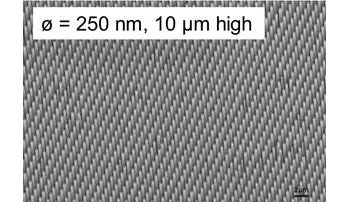NanoWires: a European project to support the development of energy recovery systems
The LNE Nanotech Institute is taking part in the European project Nanowires (High throughput metrology for nanowire energy harvesting device) funded as part of the EMPIR programme (2020-2023), which aims to support the development of energy recovery systems from nanodevices.

The LNE Nanotech Institute was selected for its cutting-edge resources and expertise in the field of metrology for nanotechnologies. The electrical, thermal and dimensional metrology teams will each contribute their resources (SMM local probe probe microscope, C-AFM atomic force microscope with conductive tip, SThM local probe thermal microscopy, AFM atomic force microscope) and their respective expertise to develop tools and methods for the traceable measurement and characterization of energy recovery devices based on vertical nanowires (nanowires).
Develop tools and methods to measure the characteristics of nanowires
These devices contribute to the development of renewable energy sources (solar, heat and motion) and have made encouraging progress in recent years. However, due to the nanometric size of the wires and the large size (m2) of the device, they also pose challenges for testing and characterization. Average values of their properties can be measured, but there is a lack of quantitative means to link and correlate the performance of individual nanowires to that of the device as a whole.
This project aims to develop reliable and high throughput metrology for the quality control of these systems and to facilitate the adoption of the measurement technology and infrastructure developed by the measurement supply chain, standards development organizations (IEC TC 113 and IEC TC 82) and end-users (manufacturers of solar cells and power generators). The following properties are concerned:
- dimensional measurements including 3D shape (cylindrical, prismatic, pyramidal) and sidewall roughness measurements;
- electrical (current-voltage characteristic, conductivity, concentration variation...) with an uncertainty < 10 %);
- thermoelectric (thermal conductivity less than 10 W/(m-K) with an uncertainty < 10%).
More information on:
L'institut LNE-Nanotech (in french)





